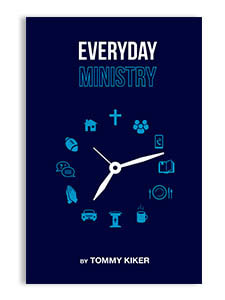 I picked up a little book from a pastor's conference a few weeks ago I finally got to read today. It's called Everyday Ministry, written by Tommy Kiker, who is on faculty at Southwestern Seminary in Texas. What I appreciated most about the book was its accessibility and clear trajectory - this is a book written to help ministry leaders (and prospective leaders) figure out what God's doing in their lives. The C's have often been used to describe a profile for ministry. Bill Hybels used Character, Competence, and Chemistry. Ron Edmondson uses Character, Commitment, and Competence. Lifeway Leaders uses Character, Conviction, Care, and Competency. I even threw my hat in the ring with my list of Calling, Character, Competency, and Chemistry. The point behind all of that is to show that a call to ministry is more than an ethereal feeling or supernatural pull. It's embodied in our salvation story where we're first found in Christ before we're found in a pulpit. It's also in the confirmation process that a leader goes through where others are a part of the calling-out process. Kiker draws from the idea of someone feeling called to ministry but not having any church or other leaders affirm that call--it likely means that person isn't fit for ministry. But there's also a skill set involved, which is secondary to character. And that's where we have to remember the difference between a fruitful minister and a successful businessman. Talent can take someone far in coaching, business, or other fields. But for ministry, our "success" is only found as far as our character will take us. Accountability with our spouses, with our time, with our integrity, money (personal and church), and how we guard not only our eyes but our hearts (Kiker even delves into the "Billy Graham Rule" on being alone with another woman. The take home point was essentially "When it comes to money or women, hands off if it's not yours." I'd be curious to know how many out there who preach regularly are able to preach without using notes. The text-driven preaching model taught and modeled at SWBTS lends itself to being freed up from using notes. And it's personal, but I don't trust myself with my ADHD and general forgetfulness to not at least have a cheat sheet with me. I can ski without poles, but I'm always grabbing them before hitting the slopes, just in case. So how about you? Do you use notes? An outline? Manuscript? How much do you take with you? Have you ever tried going without notes? Leave a comment!
1 Comment
Jim Simmons
3/7/2018 08:33:38 pm
a good word, Brother! I use notes for every service, but for Sunday morning, especially, I use one page with highlights, as memory tags and commit much of it to memory. I will steal a quick glance to see that I am going from A to B, but no more. On Sunday and Wednesday nights, I rely on another page or two, not in detail, but primary and secondary points, so I don't drift!
Reply
Leave a Reply. |
Scott M. DouglasA blog about leadership and the lasting legacy of family ministry. Archives
August 2023
Categories
All
|
 RSS Feed
RSS Feed



